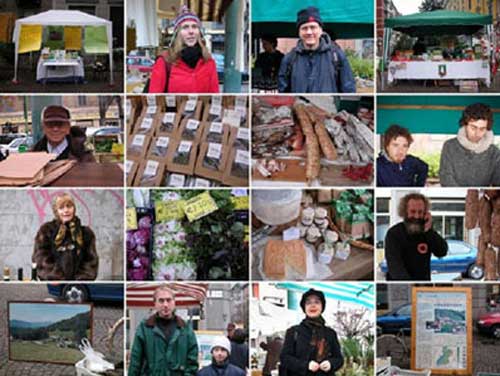BIOMERCATINO: THE LITTLE ORGANIC MARKET.PDF

A street market that sells organic products and promotes a healthy and environmentally responsible lifestyle.
Key Innovation
The promotion, production, distribution and consumption of organic products by creating an alternative distribution channel for small local producers.
Problematic background and context
In 1991 the Italian Green Party lost the referendum concerning the use of pesticides in the Italian agriculture system. Biomercatino appears 12 years later as a reaction to the increasing threats related with food security and the introduction and use of genetically modified seeds, pesticides, etc. VAS Lombardia, the promoter of this solution is an association which, develops projects and activities that discusses the use of biotechnology; the safeguard of local and traditional agriculture; environmental protection; pollution (water, air, soil, etc.), recycling and related topics. On top of that, it also promotes a natural and healthy life style within the urban environment. In the city of Milan, street markets represent one of the most traditional forms of commerce in terms of territorial presence (every neighbourhood has one or more) and also in terms of frequency (except for Sundays). Biomercatino, in this way, is also part of this tradition.
Solution description
Biomercatino is a street market that gathers small local organic producers from the Lombardia and nearby regions. Around 45 stands of producers and retailers sell certified organic products like vegetables, fruits, cheese, sausage, honey, olive oil, etc. Crafts, non-treated cotton clothes, herbal products and books about culinary and natural medicine are also sold. VAS/L promotes this solution by coordinating the encounter of producers, retailers, artists, craftsmen and volunteers. It also obtains the necessary permits from the local public administration to promote the market. At last, communicates the initiative to the population by sending press releases to newspapers and radio stations. The stands are built up within different typologies and are assembled independently by the retailers who must clean the area afterwards. Everything is made under the supervision of VAS/L.
Timeframe
The solution was implemented on April 2003
Development phase
Diffusion:
In terms of diffusion of the solution, we can affirm that Biomercatino is a case of low diffusion, since it is not an absolute novelty or neither an isolated case.
Maturity:
Today, Biomercatino is passing through a phase of optimisation. This phase conveys the direct involvement of local institutions, a larger definition of participants in terms of typology of products/services adding value to the existing offerings and help diffusing the driving values of the initiative. The project is searching for new possible synergies with like-minded initiatives (i.e. Slow Food movement) in order to create a more complete, innovative and sustainable solution. In general, is trying to refine its management system through the implementation of a database, more efficient communication and the possibility to use paid labour in the organization of the solution despite the current model of volunteer work
Revenue/costs model
VAS/L is a no-profit association and it gets access to the use of Piazza Gramsci on a free basis. No other public services like street cleaning is provided. VAS/L uses volunteers during the market. Exhibitors pay to VAS/L € 40,00 per stand to participate in the market. All related logistics costs are paid by the exhibitors themselves. VAS/L estimates that the amount of sales is around € 50.000 per event, although it never got access to this information from the participants.
Social evaluation
On the social side the benefits are: the promotion of an urban healthy life style by creating the concrete possibility for city inhabitants to be better informed and to acquire organic and safe food; to guarantee the survival of local producers; it also promotes a form of conviviality not found in city super markets and re-connects city and country side.
Environmental evaluation
On the environmental side the benefits are: the production of organic food avoiding the introduction and use of genetically modified seeds and pesticides in the environment following organic and seasonal cultivation techniques; the preservation of endogenous species and the original landscape and the reduction of transportation of goods from distant regions. The Biomercatino also promotes activities of recycling; diffusion of information and education on environmental protection, food security issues and encourages the use of public transportation.
Economical evaluation
A new and alternative retail channel for small biologic producers and retailers with enhancement of visibility and production; new business opportunities like agro-tourism; consumers can find healthy organic food at competitive costs in comparison with other specialized shops or supermarkets.
Authors
Eduardo Staszowski, Adriano Giannini / Politecnico di Milano / Italy